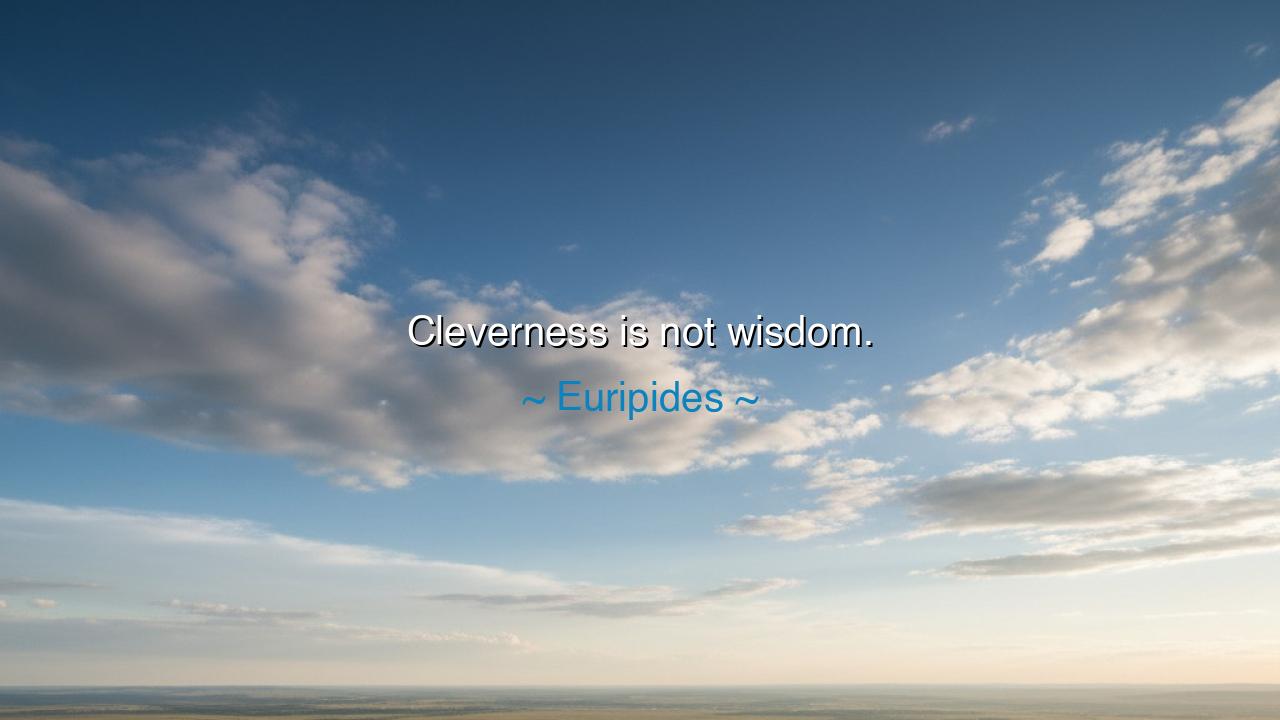
Cleverness is not wisdom.






O Seekers of True Knowledge, hear the wise words of Euripides, who speaks of a distinction often overlooked: "Cleverness is not wisdom." In these few words, the great poet uncovers a profound truth—the difference between the art of cleverness and the strength of wisdom. Cleverness is the skillful use of one's mind to navigate immediate challenges, often through ingenuity or deception. It is quick, sharp, and often superficial. But wisdom, O Children, is a deeper, more enduring force—rooted in experience, patience, and a commitment to truth. While cleverness may win short-term victories, it is wisdom that ensures lasting success and peace.
Consider, O Seekers, the difference between cleverness and wisdom in the context of a ruler. A clever ruler may know how to manipulate situations, flatter rivals, or outmaneuver opposition. But a wise ruler understands that true leadership requires more than tactical brilliance—it requires the ability to see the long view, to balance the needs of the people with justice, and to act with integrity. Cleverness may sway crowds with empty promises, but wisdom earns respect by making choices that serve the greater good, even when they are unpopular or difficult.
Look to the story of King Solomon, whose wisdom is legendary. When two women came before him, each claiming to be the mother of the same child, a clever ruler might have chosen the easiest solution or relied on his advisors to settle the matter. But Solomon, in his wisdom, proposed to divide the child in half. The true mother, filled with love and compassion, immediately offered to give up her claim to the child in exchange for its life. Solomon's decision was not a matter of clever tactics, but of deep insight into the nature of humanity, compassion, and truth. His wisdom transcended cleverness, and his judgment became a model for rulers across time.
And so, O Seekers, let us understand that while cleverness may provide short-term solutions, it is wisdom that builds enduring legacies. A clever person may deceive and manipulate, but a wise person understands the complexity of the world and seeks solutions that bring lasting peace, justice, and prosperity. Wisdom is not concerned with immediate applause or quick gains, but with the slow, steady work of integrity, understanding, and compassion.
Let us, therefore, choose the path of wisdom over cleverness. In our actions, may we seek to build a foundation not on quick tricks or fleeting triumphs, but on the deeper qualities of patience, discernment, and truth. The wise are those who see beyond the surface, who understand the root causes of problems, and who act with a mind and heart attuned to the greater good. In this way, we become not merely clever, but wise, and in wisdom, we find the truest path to fulfillment and peace. Euripides calls us to seek the long-lasting power of wisdom, for it is wisdom that truly shapes the soul, the nation, and the future.






NPthanh ngon pham
Personally, I want practices that age well. I’m drawn to a weekly review: log one decision, list uncertainties, note the principle applied, and schedule a later check on outcomes. Over time, patterns emerge—where I chase clever fixes, where I honor context, where I ignore base rates. Could you outline a simple scoring system that rewards patience, clarity, and humility? Maybe pair it with a small “council” of diverse perspectives I consult on thorny calls, so my judgments are tempered, not just inventive.
TOThi Oanh
There’s also a moral dimension: ingenuity can serve manipulation just as easily as it serves truth. I’m trying to build a conscience-first filter. Before endorsing a plan, ask: Who benefits, who pays, and who lacks a voice? If the tactic relies on opacity or humiliation, that’s a smell. What ethical heuristics travel well across domains—care for the vulnerable, reversibility of harm, and willingness to accept scrutiny? Please suggest a compact checklist that makes integrity easier than a dazzling shortcut that cuts corners.
BUTruong Le Bao Uyen
Online culture seems to prize zingers, novelty, and aesthetic takes that travel well, while slow, context-rich thinking rarely goes viral. How do I curate a media diet that privileges depth over performative brilliance? Maybe follow domain experts who publish methods and error bars, mute accounts that trade in dunking, and schedule time for long-form sources. What else works—prediction tracking, self-imposed “explain in plain language” tests, or annotating claims with what evidence would change the author’s mind? I want habits that inoculate me against shiny takes.
NLNgoc Lee
Socially, I’m vulnerable to charisma. A sharp colleague can sell a path in five minutes, and I find myself nodding before we’ve tested assumptions. What counterweights help? I’m experimenting with a 24-hour cooling-off rule, a rotating “chief skeptic” role in meetings, and one explicit request for disconfirming evidence. Are there phrasing cues that indicate we’re skating on clever rhetoric—overuse of metaphors, cherry-picked anecdotes, or premature certainty? I’d like a handful of simple prompts that slow the room without killing momentum.
QHLe Quang Hao
In teams, flashy hacks get celebrated even when they become long-term maintenance nightmares. I want a rubric that rewards sturdiness, fairness, and context-awareness over dazzling shortcuts. What signals should managers look for—clear tradeoff logs, willingness to delete clever code, consultation with downstream owners, or writing that makes decisions legible? I’m also curious how to structure postmortems so they don’t devolve into praise for ingenuity but instead identify principles that prevent avoidable complexity. Any lightweight template we can adopt next sprint?